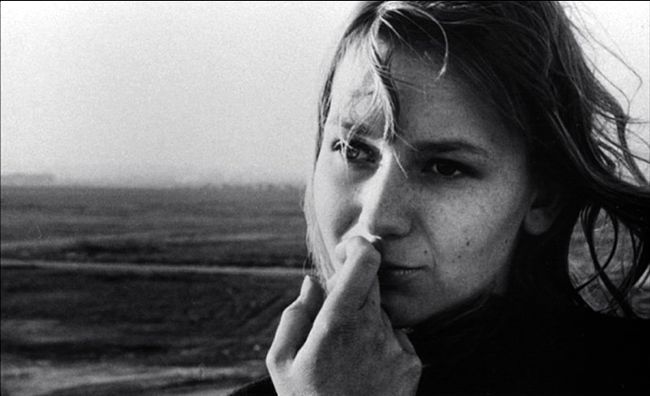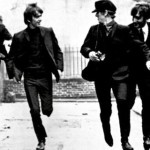
Chris Marker doesn’t fit into any of the buckets or boxes we use to contain and categorize filmmakers.
The operative description seems to be “cine-essayist” — but even that open-ended bag feels too conventional.
Most of the now-elderly French artist’s films are documentaries, of sorts, but they’re relentlessly personal, subjective and sometimes deliberately obscure.
Marker’s partly an experimental filmmaker, a specialist in arthouse fare. While his films can be difficult, especially upon first viewing, the director always knows where he’s going with his narratives and parables. Fans delight in trying to catch up.
Marker’s video distributor calls him “the best-known author of unknown films.”
His films often operate in a dreamlike state, where images can jet in from any source — in static, filmed or animated form. The ever-present narrators appear recruited from a beat poetry reading or science fiction flick.
Marker’s most famous film, “La Jetee” (1962), in fact, is best known for inspiring Terry Gilliam’s science fiction entertainment “Twelve Monkeys.” A cousin of Godard’s “Alphaville,” Marker’s relatively short film about post-apocalyptic Paris consists almost entirely of still images that are given meaning and spin by the voice-over.
“Jetee” remains unusual for the director in that it’s fiction, but the sci-fi film established a Marker marker: a focus on time as a pliable, interlaced dimension barely controlled via the interface of memory.
The Criterion Collection last year released “La Jetee” on a double-bill with the swirling travel journal “Sans Soleil.” That widely praised DVD introduced the relatively unknown filmmaker to many here in the States. Now comes a quartet of Marker releases from Icarius Films (First Run).
Begin with the best: The curious and adventurous should turn to “La Jetee”/”Sans Soleil,” a marvelous disc that appeared on this DVD blog’s list of 2007’s top DVDs. These are the essential Marker films, coming two decades apart.
The “La Jetee” slide show technique is reprised on “Remembrance of Things to Come” (2001), the most compelling of the four new DVD releases.
“Remembrance” surveys the photography of French street photographer Denise Bellon (1902-99). In her between-the-wars photography, Marker finds a persistent and thematic foreshadowing of WWII’s destruction of Europe. Marker’s narration (read by Alexandra Stewart of “San Soleil”) makes the case for Bellon’s prescience.
The film, co-directed with Bellon’s daughter Yannick, is framed by images from the first major surrealists exhibition and the last. (Bellon was a friend and booster of the pioneering surrealists.) In between, we see plenty of everyday life, a World’s Fair, Africa, the Spanish Civil War, the Popular Front, the rise of Hitler’s National Socialists and the Occupation.
Bellon’s work stands on its own, but Marker added newsreel footage to fill in some of the gaps. As with most Marker films, the stated subject matter (Bellon’s photography) is really a window to the true subject (the roots of the deadliest world war).
And so it is, as well, with Marker’s “The Last Bolshevik,” ostensibly a biography of the Russian filmmaker Alexander Medvedkin but in full a subjective history of Russia and the Soviet Union — from the October Revolution to the eve of the Berlin Wall’s fall. One witness calls the Soviet director “a whole era condensed into one life.”
The Marker docu runs in two hourlong parts, with chapters of spoken “letters” to the Soviet director. Medvedkin was a “true believer,” both a Red Army general and an outcast, whose story is told through interviews, scenes from his films and the usual Marker video fever dreams.
Medvedkin’s “Happiness,” an offbeat semi-comedy from 1934, accompanies the “The Last Bolshevik.” The film failed to amuse the Red authorities, who nonetheless allowed the director to continue his career.
The hard-left’s takes on wars in Vietnam and Iraq inspire the other two Marker DVDs.
“The Sixth Side of the Pentagon” (1967, 26 minutes) is a tight and mostly straightforward docu about the antiwar march on the Pentagon that was chronicled in Norman Mailer’s “The Armies of the Night.”
Marker does a brilliant job of setting up the confrontation between the well-organized protesters and the young security forces outside the military fortress. The narration skews hard left, of course, but the camera seems to respect both sides. Marker focused a lot on faces, giving the footage a contemporary feel. Some of the long shots recall Kurosawa, whom Marker would later profile in “A.K.”
“Pentagon” is paired with “The Embassy” (1973, 21 minutes), an 8mm work of fiction that appears to document the trials of a bunch of Europeans hiding in an embassy during a third-world coup. The audio hasn’t aged well, making it a strain to follow the minimalist plot. A minor work.
“The Case of the Grinning Cat” provides an excuse to cover the French reaction to the events of 9/11. Much of this concerns a presidential election, which keeps things pretty much localized.
Marker, long fond of cat imagery, sets out to discover the source of some street art: a yellow grinning cat that started appearing here, there, everywhere in Paris during the tense period. Marker’s tale of the cat and his bemused take on the “flash mobs” that found plenty to protest in those days come in sharp contrast to the violence and urgency of the “Pentagon” film.
The most interesting material on the disc comes in a series of short films about animals. “The Bestiary” contains five shorts, some weird and some cute. 1972’s “Three Cheers for the Whale” makes a quick run through the history of commercial whaling, protesting the super-efficient modern hunting of the giant animals. It’s framed as a letter (or lecture) to whales.
* * * * *
In the 1985 documentary “A.K.,” Akira Kurosawa says there are so many beautiful images to be found around a location shoot, it’s a shame no one ever films them. Marker does.
The docu maker, in his narration, cites the temptation to feed off Kurosawa’s gorgeous set-ups for the warlord movie “Ran,” but promises to film the proceedings from “our level” — as in, the grunt’s-eye level. Not much of a handicap for Marker as he wanders around the location on Mount Fuji, with its fog-wrapped prefab castles and armies of feudal-warrior extras.
It takes all of 10 seconds for Marker to invoke his great theme of memory, but for this project the documentarian is content to remain still much of the time, letting the film be carried by images, the music, the sounds of men and horses, and Kurosawa’s observations on filmmaking.
“A.K.” seeks no truths beyond what is there for a visitor’s ears and eyes. Marker remains reverential throughout, a fan and a disciple. Appropriately, he takes to calling Kurosawa “sensei,” meaning master.
Kurosawa is observed closely, but never interviewed on camera. The master’s comments come from low-fi audio cassette recordings, which Marker says were recorded as Kurosawa was talking with friends. (Marker, presumably, counts as a friend.)
“A.K.” is available on Criterion’s latest version of “Ran,” a double-DVD set worth owning for a host of reasons, including Marker’s fine docu.
Fans of Chris Marker surely will appreciate another recent Criterion release, of Guy Maddin’s trippy and mysterious “Brand Upon the Brain,” a modern silent film with narrator.



Leave a Reply